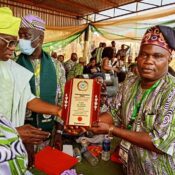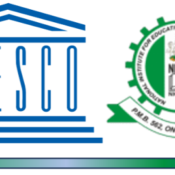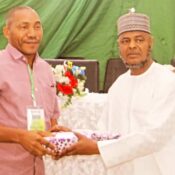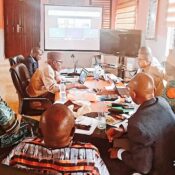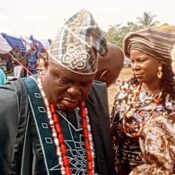From Theory to Practice: Evaluating the Impact of NIEPA’s Workshops on Education Leadership
The National Institute for Educational Planning and Administration (NIEPA), in collaboration with the Universal Basic Education Commission (UBEC), recently organized a workshop on effective school management in the 21st century for Education Secretaries, Headteachers, and Principals of Junior Secondary Schools in Nigeria. This workshop explored the demands, challenges, and advantages of successfully achieving the objectives of effective leadership and its impact on schools. One of the participants, Mallam Shafiu Shuaibu, a School Support Officer in Ringim Local Government Area, Jigawa State, shares his experiences and insights after cascading the knowledge gained from the workshop to other stakeholders in his jurisdiction. He spoke with NIEPA’s Media Officer, Bodunde Tenabe after his sharing workshop experience on Monday 26th May, 2025.

Interview Session
1. Can we meet you?
Response: My name is Mallam Shafiu Shuaibu, a School Support Officer in Ringim LGA, Jigawa State.
2. How did you know or encounter NIEPA?
Response: I have been hearing about the Institute before now, but I was opportune to attend the just concluded workshop on Effective School Management in the 21st Century that held in Kano State between May 19 and 23, 2025.
3. What specific skills or knowledge from the NIEPA-UBEC workshop on effective school management did you find most useful in conducting the sharing workshop with E/S, QA, and SSOs in Ringim LGEA, Jigawa State?
Response: I gained new methods in instructional leadership and in teaching and learning. I also learned the different criteria for making an effective school, all these I mentioned above made me want to share the programme down to the schools under my jurisdiction.
4. How many Schools do you supervise?
Response: Ringim LGA has 165 schools in it, with 19 SSOs supporting the schools to achieve their various set targets. We provide support to these schools through regular monitoring, mentoring, and provision of instructional materials. I, on my own, have 9-10 schools under my jurisdiction.
5. How did you adapt the training content to suit the needs of the 165 schools and 19 SSOs that participated in the workshop?
Response: Firstly, I went to the office of the Education Secretary of the LGA and luckily for me, I met the Quality Assurance Officer there. I narrated my experience during the week-long workshop organized by NIEPA in Kano and the need to ensure that schools under my jurisdiction and in the LGA are better and effectively managed according to the knowledge and skills I gained. They accepted my request and I went ahead to create a WhatsApp group consisting of all the SSOs to inform them of my plan to share what I have gained to improve our schools. We agreed on a date (27th May, 2025). Next, I made more copies of the module I was given at the workshop to be distributed to SSOs and School administrators (principals and Headteachers) that will attend. I also bought cardboard papers and markers to replicate the group discussions and do-it-yourself method I was taught during the workshop.
6. What challenges did you encounter during the workshop, and how did you overcome them to ensure successful knowledge sharing?
Response: Distance was a big challenge, and so also was the lack of funds. It was not easy for some of the SSOs and headteachers and principals to get to the venue because the schools are far apart and also the cost of reproducing the workshop module coupled with buying cardboard papers and other materials necessary for a successful workshop. I had to dig deep into my pocket to ensure that the workshop took place and morally encouraged my fellow SSOs that our schools and children in the LGA will be better off after the exercise and ready for the challenges of administering education in the 21st century.
7. What impact do you hope this workshop will have on the schools and education stakeholders in Ringim LGEA, and what changes do you anticipate as a result of this training?
Response: The schools in my LGA will be better because, as a result of this sharing programme we held today, the Education Secretary has set up a committee comprising of mobilization and planning officers to look into issues of long disputes between the management and SBMC of some schools. Even the issue of corporal punishment has been discovered after this programme to be a result of non-compliance with the school timetable by some teachers. We have cases where pupils and students are compelled to resume schools as early as 6 am to run errands and some cases, close late for similar reasons, are punished when they do not meet up. So, I believe with all these changes, our schools will progress, Insha Allah.
8. How do you plan to sustain the momentum and continue sharing the knowledge gained from the NIEPA-UBEC workshop with other stakeholders in the education sector?
Response: This is a big task. I believe that with the knowledge gained by the attendees and the excitement and resolve to change, things will get better. More WhatsApp groups will be created for effective monitoring, to ensure a constant flow of information so no one is left out.
9. Can you share any success stories or best practices that emerged from the workshop, and how they can be replicated in other schools or contexts?
Response: One of the success stories from the workshop is the use of cardboard, group discussions, and the do-it-yourself approach uniquely used by NIEPA. These methods made the learning experience interactive and engaging. I believe that if other schools and stakeholders can adopt these approaches, it will go a long way in enhancing the quality of education in our LGA and beyond.
10. How do you think the NIEPA-UBEC workshop has impacted your own professional development, and what changes have you made to your practice as a result of the training?
Response: It has made me more committed to my responsibilities and duties as a School Support Officer. I will go on to ensure standards and criteria for effective school leadership are enforced by the schools under my jurisdiction, and I know my colleagues will follow through.
11. What support or resources do you think would be necessary to further enhance the impact of the workshop and ensure that the knowledge gained is fully utilized by the schools and SSOs?
Response: More financial support, maybe from the LGA, SUBEB, UBEC, and even NIEPA, would be necessary. Photocopying of materials, fueling of motorcycles, and provision of conducive rooms for meetings and workshops are some of the areas where support would be needed.
Mallam Shafiu Shuaibu is a dedicated School Support Officer (SSO) in Ringim Local Government Area, Jigawa State. He participated in the NIEPA-UBEC workshop on effective school management in the 21st Century and has since cascaded the knowledge gained to other stakeholders in his jurisdiction.

